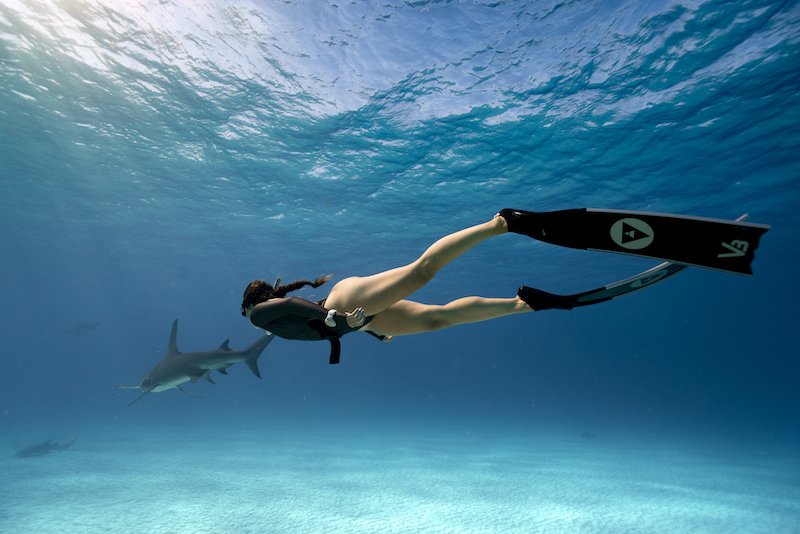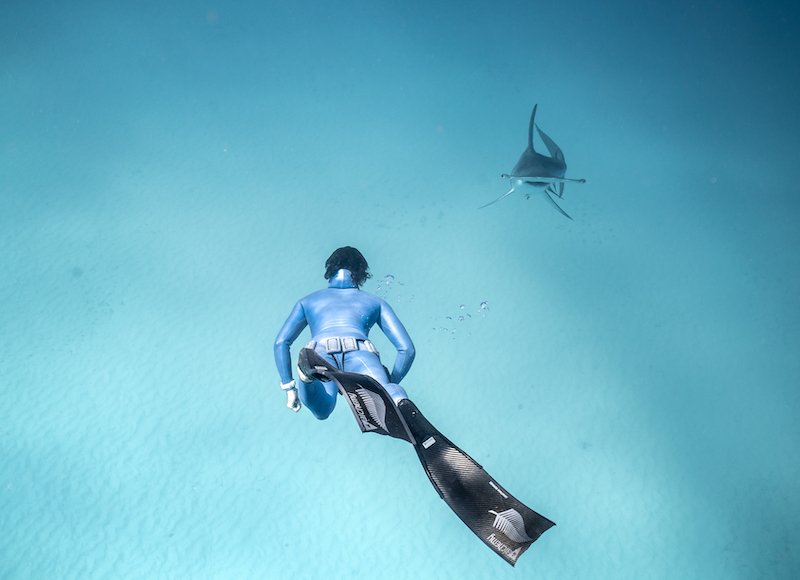
 Olivia Møller
Freediver - Activist - Explorer
Olivia Møller
Freediver - Activist - Explorer

 Olivia Møller
Freediver - Activist - Explorer
Olivia Møller
Freediver - Activist - Explorer
Beneath the surface of our planet's oceans lies a realm of wonder and beauty, teeming with diverse marine life. For adventurers and nature enthusiasts alike, underwater wildlife tours offer the chance to explore this captivating world up close. However, as interest in marine tourism grows, so too do concerns about its impact on fragile ecosystems. In this blog post, we'll dive into the realm of ethical operators who organize underwater wildlife tours, exploring their commitment to conservation, sustainability, and responsible tourism practices.
Ethical underwater wildlife tourism is a multifaceted concept that encompasses a deep respect for marine life, a commitment to conservation efforts, and the promotion of responsible tourism practices. At its core, ethical underwater wildlife tourism seeks to balance the desire for immersive experiences with the imperative to protect fragile marine ecosystems and the species that inhabit them. Here's a closer look at the key components of ethical underwater wildlife tourism:
Central to ethical underwater wildlife tourism is a profound respect for marine life and their natural behaviors. Ethical operators prioritize non-invasive interactions with marine animals, ensuring that encounters do not disrupt their daily routines or cause undue stress. Whether observing a family of sea turtles gliding gracefully through the water or marveling at the intricate dance of a school of colorful fish, participants are encouraged to maintain a respectful distance and refrain from behaviors that could harm or disturb marine life.
Ethical operators are staunch advocates for marine conservation, recognizing the critical importance of protecting fragile marine ecosystems and the species that rely on them for survival. Through active participation in conservation initiatives, such as reef monitoring programs, marine debris clean-ups, and habitat restoration projects, ethical operators strive to mitigate the impact of human activities on the marine environment. By promoting awareness of conservation issues and empowering participants to become stewards of the ocean, ethical operators play a vital role in safeguarding marine biodiversity for future generations.
Ethical underwater wildlife tourism prioritizes sustainability in all aspects of its operations, from tour logistics to resource management. This may involve implementing eco-friendly practices, such as minimizing fuel consumption, reducing waste generation, and using renewable energy sources whenever possible. Additionally, ethical operators strive to minimize their carbon footprint by supporting local suppliers, sourcing sustainable seafood, and offsetting emissions through carbon offset programs. By embracing sustainable tourism practices, ethical operators demonstrate their commitment to preserving the natural beauty and ecological integrity of marine ecosystems.
An essential aspect of ethical underwater wildlife tourism is the promotion of education and awareness about marine conservation issues. Ethical operators use their tours as platforms to educate participants about the importance of protecting marine ecosystems, the threats facing marine life, and the role that individuals can play in effecting positive change. Through informative presentations, guided discussions, and hands-on learning experiences, participants gain a deeper understanding of the interconnectedness of all life in the ocean and are inspired to take action to protect it.

At the heart of ethical operators' mission is the preservation of marine biodiversity. They are dedicated to safeguarding delicate ecosystems and the myriad species that call them home. Through strategic site selection, adherence to strict environmental regulations, and active involvement in conservation projects, ethical operators minimize the ecological footprint of their tours while actively contributing to the protection of marine habitats. By prioritizing conservation efforts, they ensure that future generations can continue to marvel at the wonders of the underwater world.
Ethical operators curate immersive experiences that offer participants intimate encounters with marine diversity. From vibrant coral reefs teeming with life to mesmerizing encounters with elusive ocean giants, these experiences ignite a sense of wonder and appreciation for the intricacies of marine ecosystems. Through guided tours led by knowledgeable guides, participants gain insights into the behavior, ecology, and conservation status of marine species, fostering a deeper connection to the underwater world.
Ethical operators recognize the power of education in fostering marine conservation. They leverage their tours as platforms for raising awareness about pressing environmental issues, such as habitat degradation, overfishing, and climate change. Through informative presentations, interactive workshops, and guided discussions, participants gain a deeper understanding of the interconnectedness of marine life and the importance of protecting fragile ecosystems. By empowering individuals to become ambassadors for marine conservation, ethical operators catalyze positive change on a global scale.
Ethical operators lead by example in promoting responsible tourism practices among their participants. They prioritize sustainability at every stage of their operations, from eco-friendly transportation methods to waste reduction strategies. By advocating for low-impact diving techniques, supporting sustainable seafood choices, and minimizing plastic pollution, ethical operators demonstrate their commitment to minimizing the environmental footprint of underwater tourism. Through their actions, they inspire participants to adopt sustainable habits and become stewards of the marine environment.
Ethical operators actively support scientific research initiatives aimed at advancing our understanding of marine biodiversity and informing conservation strategies. They collaborate with marine scientists and research institutions to collect valuable data on marine populations, monitor environmental trends, and identify areas of conservation concern. By contributing to citizen science programs, participating in biodiversity surveys, and sharing findings with the scientific community, ethical operators play a vital role in shaping conservation policies and protecting vulnerable species.

Ethical operators in underwater wildlife tourism recognize the importance of respecting marine life and minimizing human impact on fragile ecosystems. They adhere to strict guidelines for responsible interactions, ensuring that encounters with marine animals are conducted in a manner that prioritizes the well-being of the animals and their habitats. By following these guidelines, participants can enjoy meaningful experiences while minimizing disturbances to marine life. Here are key principles for responsible interactions with marine life.
One of the fundamental principles of responsible wildlife interactions is to maintain a safe and respectful distance from marine animals. Ethical operators establish guidelines that specify minimum approach distances for different species, taking into account factors such as the animal's size, behavior, and sensitivity to human presence. By adhering to these guidelines, participants can observe marine life without causing undue stress or disruption.
Touching or disturbing marine life can have harmful consequences for both the animals and their habitats. Ethical operators educate participants about the importance of avoiding physical contact with marine animals, including touching, feeding, or chasing them. By refraining from intrusive behaviors, participants minimize the risk of injury to marine life and reduce the likelihood of habituation to human presence, which can alter natural behaviors.
Ethical operators employ non-invasive observation techniques that allow participants to observe marine life without causing disturbance. This may include using snorkeling gear to observe animals from the water's surface or employing underwater cameras to capture images and videos from a safe distance. By using non-invasive techniques, participants can enjoy close encounters with marine life while minimizing their impact on the animals and their habitats.
Many marine ecosystems are protected by laws and regulations designed to safeguard fragile habitats and vulnerable species. Ethical operators adhere to these regulations and avoid operating in protected areas without proper permits. By respecting marine protected areas and wildlife sanctuaries, participants can contribute to conservation efforts and ensure the long-term sustainability of marine ecosystems.
Excessive noise and disturbances can disrupt marine animals' natural behaviors and cause stress or anxiety. Ethical operators take measures to minimize noise pollution, such as using quiet propulsion systems on boats and maintaining a tranquil environment during wildlife encounters. By reducing disturbances, participants can create a peaceful atmosphere that allows marine life to thrive undisturbed.
Education is key to promoting responsible interactions with marine life. Ethical operators provide participants with information about wildlife behavior, conservation principles, and responsible tourism practices. By raising awareness and fostering a deeper understanding of marine ecosystems, participants are empowered to make informed decisions and act as stewards of the ocean.

For conscious travelers seeking to embark on underwater wildlife tours, selecting ethical operators is paramount. By choosing operators that prioritize conservation, sustainability, and responsible tourism practices, travelers can ensure that their experiences not only enrich their lives but also contribute to the protection of marine ecosystems. Here's a comprehensive guide for choosing ethical operators:
1. Research and Due Diligence: Before booking a tour, conduct thorough research to identify ethical operators with a proven track record of responsible practices. Look for operators who are certified by reputable organizations. Read reviews and testimonials from past participants to gauge the operator's commitment to conservation and sustainability.
2. Certification and Accreditation: Choose operators that hold certifications or accreditations from recognized conservation organizations. Look for certifications such as Blue Flag certification for sustainable boating practices or Green Globe certification for environmentally responsible tourism operations. Accreditation from organizations like the Global Sustainable Tourism Council (GSTC) or the International Ecotourism Society (TIES) indicates that the operator meets stringent standards for sustainability and ethical conduct.
3. Commitment to Conservation: Select operators that demonstrate a genuine commitment to marine conservation and habitat protection. Inquire about the operator's involvement in conservation initiatives, such as marine protected area management, coral reef restoration projects, or wildlife monitoring programs. Choose operators that allocate a portion of their profits to support conservation efforts or contribute to community-based conservation projects.
4. Responsible Wildlife Interactions: Ensure that the operator prioritizes responsible wildlife interactions and adheres to guidelines for minimizing disturbances to marine life. Inquire about the operator's policies regarding wildlife encounters, including approach distances, use of non-invasive observation techniques, and protocols for minimizing human impact. Choose operators that prioritize the well-being of marine animals and educate participants about respectful behavior around wildlife.
5. Environmental Sustainability: Select operators that prioritize environmental sustainability in their operations, from energy-efficient boat engines to eco-friendly dive gear. Inquire about the operator's waste management practices, recycling initiatives, and efforts to reduce single-use plastics. Choose operators that minimize their carbon footprint through practices such as carbon offsetting, energy conservation, and support for renewable energy sources.
6. Community Engagement and Empowerment: Choose operators that engage with local communities in a respectful and equitable manner. Inquire about the operator's relationships with indigenous groups, fisherfolk, and other stakeholders in the community. Look for operators that support community-based initiatives, such as sustainable tourism training programs, cultural exchanges, or fair trade partnerships. Choose operators that prioritize the well-being of local communities and contribute to sustainable development initiatives.
7. Transparency and Accountability: Select operators that demonstrate transparency and accountability in their operations. Inquire about the operator's policies regarding refunds, cancellations, and safety procedures. Look for operators that provide clear and comprehensive information about their tours, including itinerary details, safety guidelines, and pricing. Choose operators that are responsive to inquiries and address concerns promptly and professionally.
In conclusion, choosing ethical operators is essential for conscious travelers who wish to enjoy underwater wildlife tours responsibly. By selecting operators that prioritize conservation, sustainability, and responsible tourism practices, travelers can ensure that their experiences support the protection of marine ecosystems and contribute to the well-being of local communities. By making informed decisions and supporting ethical operators, travelers can enjoy unforgettable experiences while making a positive impact on the planet.